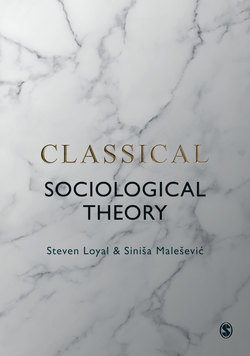Читать книгу Classical Sociological Theory - Sinisa Malesevic - Страница 41
На сайте Литреса книга снята с продажи.
The Rise and Fall of Civilisations
ОглавлениеIn The Muqaddimah the author presents us with a cyclical philosophy of history that analyses the development of civilisation through the prism of a dialectical relationship between the city and the countryside, both of which are indispensable for long-term social advancement.1 In this view civilisations gradually rise through the interdependence of two principal and distinct ways of life: (1) sedentary populations able to develop the new skills, ideas, knowledge and economic environment necessary for social development; and (2) nomadic tribes capable of providing the coercive might, solidarity and moral fibre required for the establishment, protection and long-term stability of a particular civilisation.
More specifically, he argues that nomadic warriors are the only group capable of founding or conquering the new states. The social sources of their military might stem from their unique lifestyle: a generally frugal and disciplined existence, sturdy and functional military organisation, and intense bonds of kinship and solidarity. The rigours of nomadic life, perpetual involvement in the violent conflicts, loyalty to their chieftains and tight group attachments enable tribes not only to establish states, but also to maintain the stability of state rule. While the tribal cohesion generates military power and security, city life remains crucial for economic productivity, day-to-day governance, and social and cultural development. Although the nomadic warriors are good at conquering lands, protecting and policing towns, they are quite feeble at generating ‘luxury goods, clothing, sophisticated cuisine, refined pleasures, relatively sumptuous houses, and social accomplishment’ (Lacoste, 1984: 96). Hence a prosperous and stable civilisation entails a symbiotic relationship between the two principal social strata – tribal warriors and urban dwellers.
Nevertheless, as civilisations advance, they also sow seeds of their own demise. As Ibn Khaldun (2005: 296) emphasises: ‘The goal of civilization is sedentary culture and luxury. When civilization reaches that goal, it turns towards corruption and starts being senile, as happens in the natural life of living beings.’ Since the state’s stability is grounded in asceticism, moral purity, tribal solidarity and loyalty, once the tribal warriors settle in towns their frugality and social cohesion evaporate and they slowly, but surely, become corrupted by the luxuries of sedentary life. Hence all civilisations undergo cyclical transformations with periodic growth, expansion and inevitable decline.
For Ibn Khaldun the rise and fall of civilisations is determined by the complex social relationships rooted in the changing political dynamics. In his view the durable social order entails not only coercion, but also a substantial degree of group solidarity. Life outside the state is dependent on the social cohesion of lineage, kinship and deep friendships. The nomadic tribes living in inhospitable environments where there is a chronic shortage of food and water and constant dangers of raiders, carnivorous animals and natural disasters would not be able to survive without strong group attachments. In his own words: ‘Those who have no one of their own lineage feel affection for their fellows. If danger is in the air … such a man slinks away… Such people, therefore, cannot live in the desert’ (Ibn Khaldun, 2005: 98).
